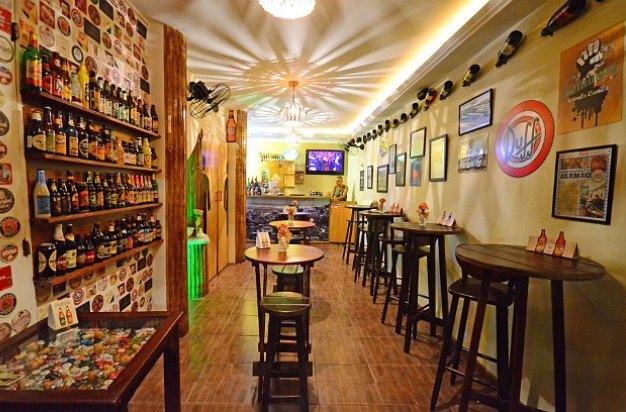The bar is small, housed in a converted garage near an entrance to the vast Complexo do Alemão favelas in Rio de Janeiro’s north side. But step inside, and big ambitions are on display: 120 types of beer from places as distant as Belgium line the wall.
Despite its outsized aspirations, Bistrô Estação R&R is booming. In five years, the bar has become a hotspot for beer lovers local and foreign. On weekends, connoisseurs pack its tables and spill into its illuminated garden. All this despite the Brazilian penchant for light, bland brew, a wrenching national recession, and the bar’s location more than an hour’s drive from any touristy beach.
Owners Marcelo Ramos and Gabriela Romualdo are about to launch a third artisanal beer of their own, part of series named after favelas in the Complexo do Alemão. The name is a clue to how these two entrepreneurs turned an improbable business, born at a difficult time, into a raging success: passion for beer, creativity, and a keen sense of timing, but also close ties to their community, a knowledge of their market, and of course, hard work.
“I always say that people who are poor, black and favelada are born entrepreneurs,” he said. “We don’t stand behind the counter waiting for customers to come in so we can make a sale. We go after customers.”
Even so, Ramos said, it felt like a real gamble at first.
“Everybody thought I was crazy when I said I wanted to sell specialty beer in the favela,” he said. “Nobody even knew what that was (in 2012).”
Naysayers had a point. A bottle of regular beer in the favela sold for 3.50 Brazilian reais ($1.11). Would anyone pay ten times more for a newfangled product they’d never heard of?
Plus, Brazil is one of the toughest countries in which to start a small business. Bureaucracy is the biggest hindrance. It takes, on average, 117 days to open a business. This pushes Brazil to number 175 out of 190 countries on the Ease of Doing Business Index compiled by the World Bank.
Yet there are still 9 million micro and small businesses in the country, which together are responsible for 27 percent of the GDP. With a severe drop in the availability of traditional employment over recent years, Brazilians have become creative and turned to entrepreneurship to make ends meet.
The success of entrepreneurs like Ramos and Romualdo was due, in part, to their ability to see an opportunity where others did not, said Guilherme Afif Domingos, president of Sebrae, the Brazilian Service of Support for Micro and Small Enterprises.
“Entrepreneurs who seek to innovate are very likely to succeed,” said Domingos. “Promising businesses are those that meet the demands of a community – whether they offer products or services – and invest in training and knowledge.”
In the case of Ramos and Romualdo, it was their strong community connections, and word-of-mouth marketing that brought locals to their door – and curiosity, of course. Ramos brought in the first customers; after a beer or two, tentative clients became regulars. Just two years after opening the bistro, Ramos and Romualdo released their first artisanal beer. It was a lager, intended to introduce favela residents to something similar to the beer they typically drank before moving on to other types, like weiss and India pale ale (IPA).
Ramos understood that learning process; he had his first artisanal beer in 2011. Back then, he had a job repairing telephone lines. One day, after work, he stopped at a bar in downtown Rio and decided to try a Paulaner, a German beer. It just clicked: He wanted to bring the specialty beer business to his community.
The field was entirely new to him. He had to start from scratch, researching how to brew beer, attending tastings, meeting sommeliers and others in the industry. Soon, he had friends in the business. After all, he said, “it’s easy to make friends when you’re having a beer.”
The next step was convincing his father-in-law, who owned the building where the bistro now sits. Understandably, he had a few concerns when his daughter and son-in-law said they wanted to sell beer out of his garage.
“At first he thought it would be like a regular bar and that it would cause problems,” Ramos said. “But when I explained the concept – that this type of beer is about quality, not quantity – he understood, and gave us a chance.”
Then it was a matter of winning over a broader clientele. Ramos did that by giving them a good product, with a side of pride-of-place. While the original draw for new customers was the bistro’s large selection of beer, it was the favela-made Lager named Alemão that cemented their loyalty.
Ramos and Romualdo also wanted to expand their customer base beyond the favela. For that, they knew 2014 was key, the right moment to put their own beer on the shelves. The World Cup brought a stream of tourists to Rio, and the inauguration of the cable car made the favela, and Bistrô Estação R&R, more accessible. Now their challenge was showing visitors – foreigners, and Rio residents from affluent beach-side neighborhoods – that favelas are more than the violence they see on TV.
It worked. The novelty – “What was a bistro selling artisanal beer doing in the favela?” – drew visitors when Rio was booming, and the devotion of locals kept them going in leaner years.
“Networking in the favela is worth more than any flyer or Facebook page,” Ramos said.
Now, Ramos and Romualdo are expanding into other parts of town, courting beer stores across Rio de Janeiro and São Paulo, and opening a second location in the Carioca Shopping mall. One of their first customers, an early convert, opened Bistrô Estação R&R’s first franchise in the Bangu Shopping mall.
Ramos hopes more franchises are in their future – despite saying, with a laugh, that it “hurts my heart a little” to put his beer in the hands of others. A second franchise will start its trial phase in December, and Ramos is considering other requests.
Despite this success, Ramos is happy to spend most of his time at the original Bistrô Estação R&R. He and Romualdo launched their second beer, a weiss named Nova Brasília, after the location of the bistro, last year, and plan to introduce a longneck called Fazendinha Pilsner for the Brazilian summer. They also have plans for an IPA called Grota and a stout named after the Baiana favela, known for being the darkest part of Complexo do Alemão.
“What we want to do is have Complexo do Alemão beer represent every part of our community,” Ramos said. “Because really, we do this for the people in the favela. They are the ones who helped us get there. They deserve to be recognized.”
—
Langlois is a journalist based in São Paulo






